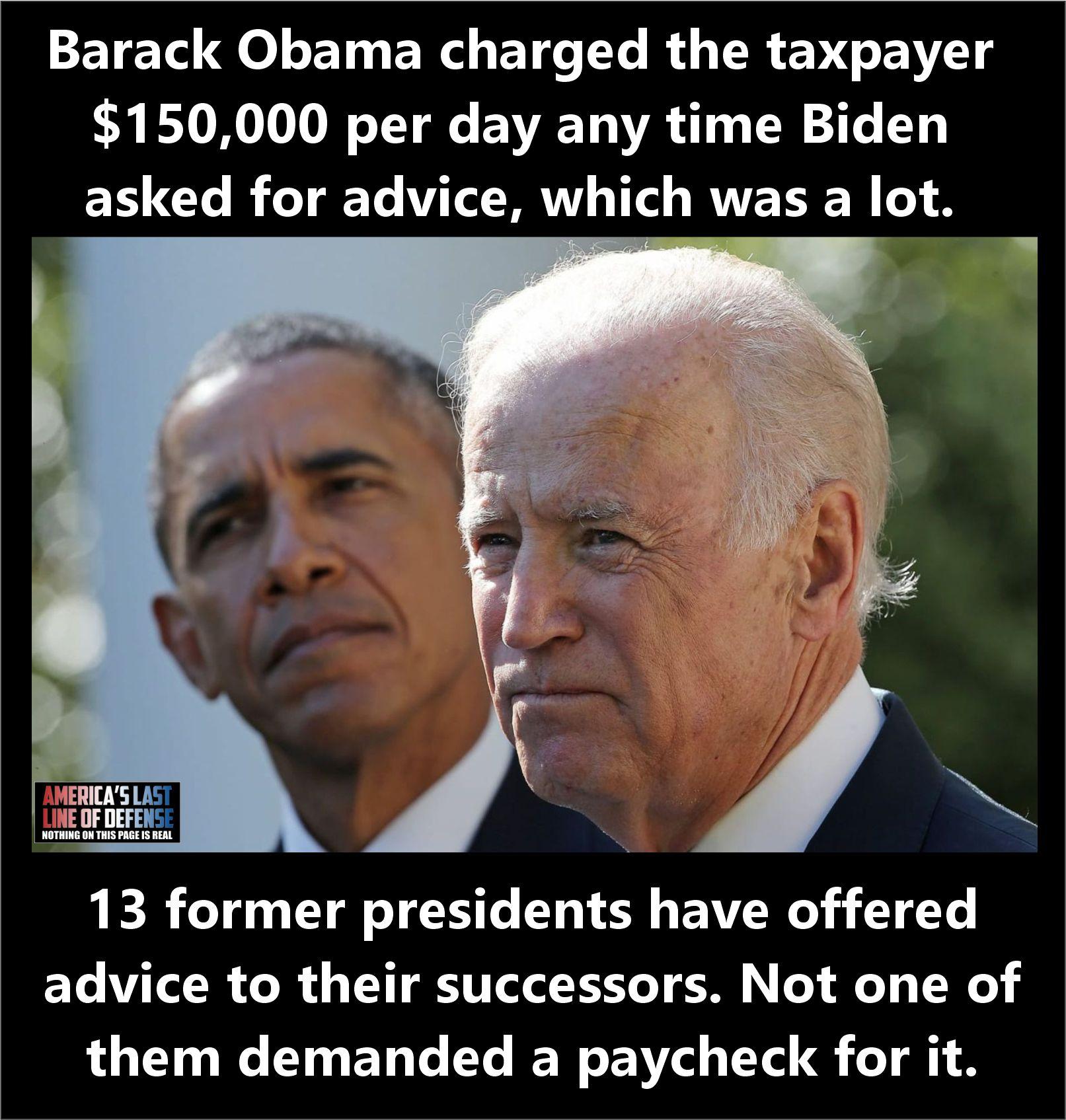The image of Barack Obama whispering advice to Joe Biden has become iconic in American political culture. Memes, jokes, and satirical posts have turned their partnership into a running commentary on trust, mentorship, and at times, playful dependence. But one viral claim has taken this dynamic to absurd new heights: the idea that Barack Obama charged taxpayers $150,000 per day every time President Biden asked for advice. Though the assertion is patently false and clearly satirical, it has spread across social media like wildfire, sparking laughter, disbelief, and even outrage among those who took it at face value.

The meme plays on two themes that resonate strongly with the public: the perception of government waste and the close personal relationship between the two men. Obama and Biden worked together for eight years in the White House, forging a bond often characterized as more fraternal than professional. Biden has frequently referred to Obama as a trusted confidant, and their public interactions are filled with warmth and humor. To suggest that Obama would suddenly become a “consultant” charging his protégé astronomical sums for advice is not only absurd but also irresistibly funny in the world of political satire.
The claim also draws attention to the broader tradition of former presidents advising their successors. History shows that while not all presidents get along with the men who replace them, there is often a sense of continuity and respect that allows for occasional consultation. Bill Clinton and George H. W. Bush worked together on humanitarian initiatives, George W. Bush maintained cordial ties with Barack Obama, and Jimmy Carter was frequently sought out for his expertise in diplomacy. None of these figures demanded or received compensation for offering counsel. The idea that Obama would break this tradition for financial gain is what gives the meme its sting.
At the same time, satire of this sort taps into the public’s skepticism about money in politics. Americans are often frustrated by the perception that politics and wealth go hand in hand, with public servants somehow leaving office wealthier than when they entered. A claim that Obama earned six figures a day for mere advice exaggerates this perception to comic effect, underscoring the suspicion that politics can be a pathway to riches rather than a calling to service. In this sense, the meme reflects not just humor but also deep cynicism about the political system.
Of course, there is no evidence that Obama has ever charged Biden—or taxpayers—for advice. In reality, Obama continues to enjoy a lucrative post-presidential career through book sales, speaking engagements, and media ventures, none of which involve billing his former vice president for friendly conversations. Biden, for his part, has his own team of advisors, cabinet officials, and policy experts. Any notion that he would pay Obama daily consulting fees is firmly in the realm of satire, not fact. The meme even comes stamped with a disclaimer: “Nothing on this page is real.” Yet that hasn’t stopped it from being shared as though it were genuine.
The viral spread of the claim illustrates how satire can easily blur into misinformation. In a polarized political climate, where trust in media is low, many people are inclined to believe the worst about their leaders or opponents. A humorous exaggeration can quickly become “evidence” for critics who want to believe it. For Obama supporters, the meme is just another example of creative, tongue-in-cheek humor. For detractors, it becomes fuel for the narrative that elites exploit taxpayers. The same content, interpreted differently, reveals much about the current state of American political discourse.
What makes the joke particularly effective is its specificity. A vague claim would not resonate nearly as well. But “$150,000 per day” feels oddly precise, making the scenario more vivid and, paradoxically, more believable to some. Satirists know that anchoring exaggerations with concrete details enhances their comedic punch. By providing a dollar amount and contrasting Obama with “13 former presidents” who gave advice for free, the meme turns a simple jab into a full-fledged parody of greed, entitlement, and political double standards.
Beyond its immediate humor, the meme also raises questions about the expectations Americans have for their leaders. Should former presidents serve as elder statesmen, freely offering guidance to those who follow? Should they retreat into private life, focusing on their foundations, memoirs, and personal pursuits? Or does the public demand too much from them, expecting selfless service long after they have left office? Satire forces us to consider these questions, even as we laugh at its exaggerations.
In the end, the story of Barack Obama allegedly charging Joe Biden $150,000 per day for advice is not a reflection of reality but a mirror held up to public perception. It captures the unease many Americans feel about the intersection of politics, money, and power, while also highlighting the enduring comedic potential of the Obama-Biden friendship. Like much great satire, it works because it contains a kernel of truth—leaders do advise their successors, and money often plays an outsized role in politics—but then pushes that truth into the realm of the ridiculous.
Obama and Biden will no doubt continue to be the subject of countless jokes, memes, and exaggerated tales. Some will make us laugh, others may frustrate us, and a few will blur the line between satire and misinformation. But as long as the internet thrives on humor, hyperbole, and a touch of scandal, we can be sure that stories like this will keep circulating. And perhaps, amid the noise, they will remind us to question what we read, verify what we believe, and always recognize the punchline when we see it.





